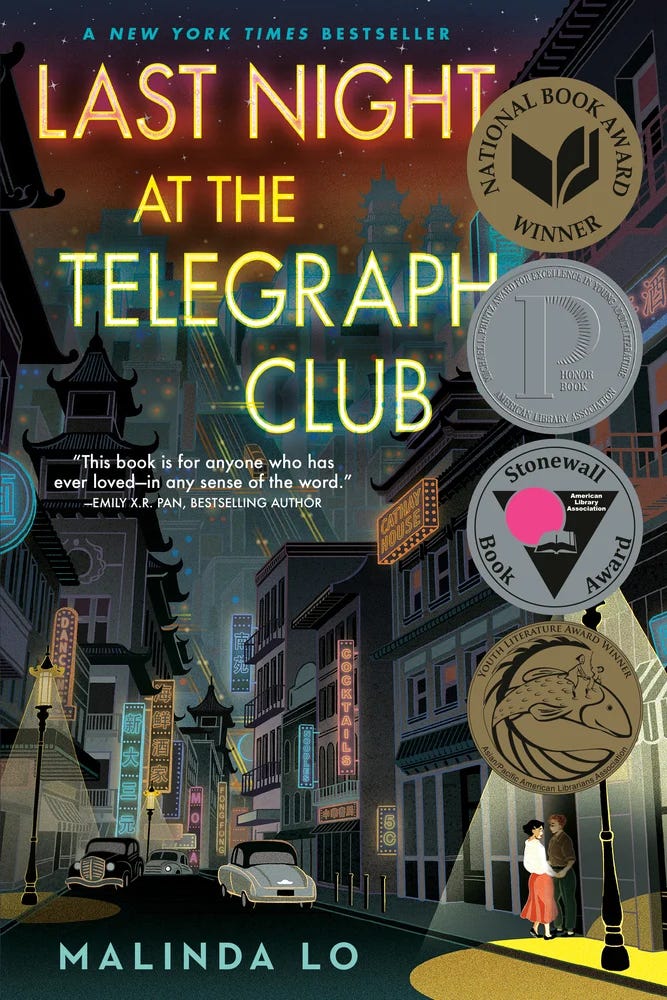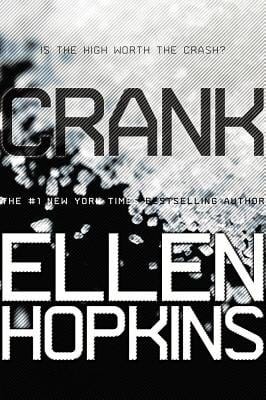Malinda Lo’s book Last Night at the Telegraph Club was just banned in South Carolina. It’s a coming of age tale about a young girl in San Francisco who is realizing that she’s a lesbian in the 1950’s. It’s a quiet, slow-burn of a book that would appeal to kids who like historical fiction. As a school librarian, I have it on my school shelves and it’s won a slew of National and State prizes. It has yet to be checked out. So, why is this literary, decidedly niche book being singled out? Because there are parents, and really just one parent who thinks that sex is bad, especially queer sex. The author writes about it in the article, Why is sex so scary to book banners?
The state board of education also elected to ban these titles as well:
Collateral by Ellen Hopkins
Empire of Storms by Sarah J. Maas
Half of a Yellow Sun by Chimamanda Ngozi Adichie
Hopeless by Colleen Hoover
Identical by Ellen Hopkins
Kingdom of Ash by Sarah J. Maas
Living Dead Girl by Elizabeth Scott
Lucky by Alice Sebold
Tricks by Ellen Hopkins
Seventeen-year-old Lily Hu can't remember exactly when the feeling took root—that desire to look, to move closer, to touch. Whenever it started growing, it definitely bloomed the moment she and Kathleen Miller walked under the flashing neon sign of a lesbian bar called the Telegraph Club. Suddenly everything seemed possible.
But America in 1954 is not a safe place for two girls to fall in love, especially not in Chinatown. Red-Scare paranoia threatens everyone, including Chinese Americans like Lily. With deportation looming over her father—despite his hard-won citizenship—Lily and Kath risk everything to let their love see the light of day.
South Carolina leads the nation in state-led book bans. Strange, considering that my home state can only boast that 54% of their 3rd graders are reading on grade level. With those kinds of statistics you would think the state would want everyone to be reading as many books as possible. I wanted to see exactly what made Lo’s book so egregious. Of course, I’ve read it so I was curious to see what this parent objected to so much that she couldn’t just tell her child to avoid it, but needed to convene a state review board. Maybe she didn’t just want attention because of personal boredom and lack of agency. Maybe she had a point. The documents for Lo’s book weren’t available, but there were documents for another book, Crank by Ellen Hopkins.
“We used to do coke til “just say no” put the stuff out of reach. Now it’s crank. Meth. The monster. It’s a bitch on the body, but damn do you fly.”
“ I felt it with every nerve, every fiber, every molecule of my being. I wanted him to kiss me, with every nerve, every fiber, every molecule of my being. But I was scared to kiss him. Every nerve, every fiber, every molecule screamed! He leaned forward, parted those perfect lips.”
Now, Crank, is a harder book to defend if challenged because it’s novel in verse about a young girl who gets addicted to meth and spirals out of control. There are depictions of how the main character, Kristina, loses her grip on her life and becomes an addict who does anything and everything for a hit. But here’s the thing, according to the CDC 15% of teens have reported using an elicit or injection based drug. The average age of first incident of prostitution in this country is, wait for it, thirteen years old.
What Crank and other books like it do is show kids what can happen to them if they engage in risky behaviors without them having to engage in those behaviors. It also teaches empathy for those who are struggling with addiction or other issues. When a kid reads Push by Sapphire, which was also banned by the state, and reads about Precious’ sexual assault it can let them know that they aren’t alone because 1 in 9 girls and 1 in 53 boys have been sexually molested by the time they turn 18. Many kids only realize they have been assaulted once they go through their first comprehensive sex education class, which squeamish parents have also banned across the nation. Not one of the books on the state banned list is being removed or challenged for violence, almost all have some reference to sex. So what’s the obsession with sex?
Any kid can read about serial killers in books like Truman Capote’s In Cold Blood, which is on the AP Language and Composition Reading list, or Devil in the White City by Erik Larson. They can pick up The Hunger Games and read about kids being blown apart, but as soon as a girl kisses another girl the cops are called. There’s no universal ban on sexual assault or any concessions for consensual first-time sex in teen books. It’s all bad, and it seems to be more bad if it’s both consensual and queer.
I have to speculate here. I hope you’ll rock with me since I’ve been so good about linking my statistics, but this isn’t about sex. This is about control. How much control conservative women are given in their lives and how much control they are allowed to exert over other people. If you can’t speak up in church, if you’re submitting to your husband at home, and you’re restricted from work that makes more money than a man or worse, working at all, then you’ve got to exert some power somewhere.
If you don’t know that lesbians exist, maybe you can be coerced into marrying a guy you just kind of like right out of high school. If you understand your own desire, you might not call girls sluts and try to use ‘purity’ as a bargaining chip for more social power.
It’s not enough to restrict their own kids from reading certain books they want to literally jail librarians, and I mean just that. SB74 in Georgia just died in the last legislative session and would have charged school librarians if they didn’t pre-emptively remove ‘obscene’ materials from the school collection. Readers, there are no obscene materials in school collections, just books that religiously conservative parents don’t like.
It seems to me that conservative parents, mostly women, are only comfortable with bad sex, not consensual sex, not loving sex, not sex that is well informed, but bad. Let me elaborate.
Bad sex in my definition is:
Coerced sex: as in the sex that some preachers are going viral online about by telling their parishoners that wives CANNOT refuse sex from their spouse while married.
Desire-free sex: as in sex that denies the existence of female desire or suppresses queer desire in all forms. This is most evidenced by conversion therapy where those with queer desires are taught to suppress those feelings in favor of an ascetic lifestyle or heterosexual relationships. You can see the results of this ideology in the TLC show, MY HUSBAND’S NOT GAY
Sex based in ignorance: This is sex where people aren’t taught how to clean themselves properly or protect themselves from disease or pregnancy.
This is not to say that Young Adult books need sex in them. On the contrary, I’m concerned about the number of adults on BookTok who have been quite vocal about the ‘spice’ level they’d like to see in books with teenagers. There’s a difference between erotica and love scenes meant to sexually excite the reader and reality based depictions of sexual behavior. This may be a hard line to understand, but do you know who is trained to understand it? Librarians.
If you want to join the fight against book bans click here. If you want to drop me a five for some coffee then click here!





